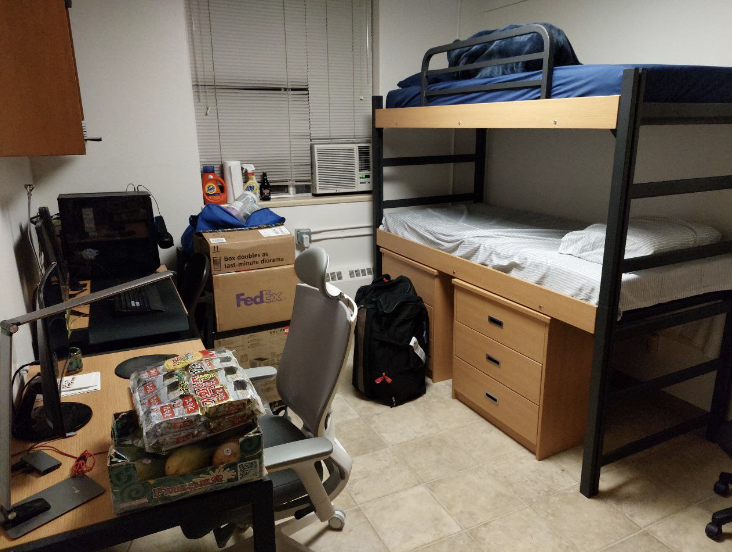Surviving a Year in Marks House

“Go to a Nordic country and commit a crime that will get you a school term of jail time… do your work remotely from there in luxury and comparative extravagance,” says Josiah Miller (Ay ‘24, Venerable).
From burst pipes leaking noxious fumes, to six weeks without hot water, residents of Marks House, myself included, have experienced a seemingly unending stream of problems. Problems that have been made worse by slow-acting maintenance, living in singles converted to doubles, and being isolated from the rest of our houses.
Before we talk about the technical issues with the house, something residents of Marks (a.k.a. “Marksists”) had to get used to, is the sterile, dreary, and uncanny ambience of the place.
Old, run-down facilities (Marks was built in 1961), a lack of murals or posters, and the overall absence of a house community make it this way. It’s a stark contrast to the cozy, lived-in feel of residential houses.
I recall the sole public kitchen in the basement. Upon pressing the light switch, one of the lights halfway would flicker to life, bathing visitors in the ambience of a bathroom in a SAW movie. The walls were an off-white, dyed from the smoke of burnt food. The only decorations it bore were mystery food splotches and a badly chewed up cork board. I would later donate a FNAF poster to contribute to the vibe.
However, some of these issues have been mitigated with kitchen and lounge touch-ups, and the fixing of broken hallway lights.
The technical issues started with the wiring. When residents turned on their AC unit, or other high-wattage appliances like hair dryers, the circuit breakers frequently tripped, even when using outlets designated as “for AC units only”. Sometimes, this would shut off power to two rooms at a time. Due to these surprise outages, some students have even lost progress on work.
The bathrooms weren’t perfect either. In the second floor men’s restroom, the area outside of the showers frequently flooded. “I had to swim from the bathroom door to the shower,” recalls Josiah. This issue was partially fixed by extending the shower door to the floor.
2 washers and 2 dryers were also shared among 50 students, with one of the washers being often broken. This prompted some to cross the street to get to the north houses to do laundry.
In Winter term, Marksists had little to no hot water for a six-week period. Due to this, many made nightly (or weekly) pilgrimages to the North and South Houses in search of warm showers. These determined Marksists braved cold winter nights, often clad solely in a towel, and carrying showing supplies.
“We walked through Ven, Lloyd, and Blacker with towels, flip flops, and shampoo in the middle of winter. We finally ended up taking our first hot showers in over a week at Blacker,” says Lucas Ancieta (CS ‘25, Blacker), recalling one of such journeys. ”We played Splish Splash by Bobby Darin during the trek.”
Also during Winter term, a steam pipe burst in the basement which leaked some rancid air all throughout Marks, and got water on everything in the basement, and flooded it. I recall leaving my room that morning and being punched in the gut with a horrible stench. For a couple days, if Markists wanted to get outside they had to hold their noses from their dorm rooms to the front door. Using the lounge, kitchen, or washing machines meant facing the hazardous, fetid, stench.
Christopher Yeh (CS G3), the Resident Advisor for Marks, has done all he can to alleviate these problems by submitting service requests and following up with maintenance. “I submitted 48 (forty-eight!) facilities service requests in my 11 months living in Marks!” he remarked.
Maintenance has been “egregiously slow” according to Yeh. “The lack of hot water was initially supposed to only last a couple of weeks. Housing Maintenance took 4 weeks to install an additional temporary hot water heater to respond to resident complaints,” he says.
Yeh also cites how it took housing 2 weeks to fix a broken washing machine, 8 months for ORE and housing to decide if students could store things in the basement, and how it’s been 3 months since he asked if the building was up to CA earthquake building codes (he hasn’t heard back yet).
As a former student RA at Stanford, Yeh contrasts his experience with housing there: “Unlike at Stanford, Caltech Housing maintenance is largely passive, instead of proactive.”
For most Marksists, however, the end of this week (6/17) marks the end of their internment. Many are glad to move back in with their house, to a comparatively luxurious single in Bechtel, or to some place with tolerable facilities.
But for an unlucky few, they’ll have to endure more of Marks next year. “Unfortunately I have been cursed with having to live in this hellhole another year because of Blacker’s wacky roompicks system,” says Sascha Goldsmith (ME ‘25, Blacker).
Though it is unknown if housing will get in some much needed renovations over the summer, we at least know there are plans to add an extra washer and dryer.
Personally, despite all that went wrong, Marks has not been all negatives. I’ve been given the chance to make friends in other houses, and the quiet of Marks has given me a distraction-free place to study for my tough smore-year classes. At the bare minimum, I’ve learned to be forever grateful to live in the houses. I hope future Markists heed my message and make the best out of their situation.